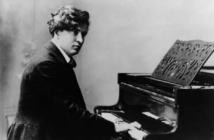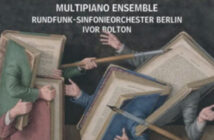 An unknown work by Benjamin Britten sets the pulse racing. It turns out to be fragments of a concerto he started writing for Benny Goodman in 194. What with Pearl Harbour and Peter Grimes, it got pushed to the back of the desk. Before Britten sailed home to England in March 1942, the only finished movement was seized by US Customs was seized on suspicion that it contained espionage codes.
An unknown work by Benjamin Britten sets the pulse racing. It turns out to be fragments of a concerto he started writing for Benny Goodman in 194. What with Pearl Harbour and Peter Grimes, it got pushed to the back of the desk. Before Britten sailed home to England in March 1942, the only finished movement was seized by US Customs was seized on suspicion that it contained espionage codes.
The movement did not see light of day until 1989 when it was retrieved and orchestrated by Colin Matthews, Britten’s composing assistant, and premiered by the clarinet virtuoso Michael Collins. The movement went down so well that Matthews filled out the work with Britten sketches for a full premiere by Collins in 2008. It would be too much to expect the disparate parts of the piece to make a convincing whole but Collins’ eloquence and advocacy are forceful and the ear warms to his unflappable English tone. Impossible to imagine what Benny Goodman might have made of it.
The Britten ‘concerto’ on this album is followed by five Bagatelles by Gerlad Finzi, representing all that Britten loathed in English music – nostalgic, antediluvian pastorality, unwilling to admit a sniff of dissonance. Detractors called it ‘cowpat music’; it has not worn well.
The rest of the album, proficiently performed by the BBC Symphony, is filled with a pair of authentic concertos by minor composers – the Yorkshireman Arnold Cooke (1906-2005) and the Welshman William Mathias (1934-92). Cooke sounds like a cheerful chappie who would have been in his element scoring comedy series for the BBC. Mathias, more morose and attuned to modernity, reminds me of a country bus shelter in the rain, a timeless passage of time, not at all unpleasant. Both he and Cooke are strong on atmosphere, an element rare nowadays. Switch off the sound on your television and play this to accompany Downton Abbey.
-
3










